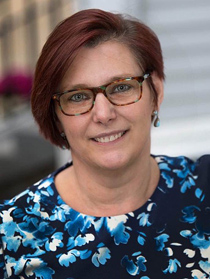
Faith
In a world that makes a point of celebrating diversity, real differences are increasingly hard to find. The flavors are diminished, and the portions are smaller than they used to be.

Wolfe
It seems strange now, but when I was growing up in Cleveland, one of the first questions we asked and answered when we met someone new was, "What nationality are you?" No one was offended. And because we knew that all our families had come to America as immigrants, it wasn't a big deal to tell someone that you were Slovenian, Polish, Bohemian, Irish, Italian, German, Croatian, Jewish or anything else. I remember some of those whose families had been in the country for more than a few generations saying they were "Americans."
In retrospect, that seems funny. The fact is that we were all Americans.
Although people then were unlikely to "hang out their dirty laundry," almost always kept their "business" to themselves, and their "cards close to their chest," they were more than willing to identify themselves with where their families had come from, and took pride in their ethnic heritage. On the upside, once someone shared their nationality with you, you probably knew what area of the city they had roots in, whether they were Catholic, Protestant, or none of the above, and their likely level of education without ever asking. You also knew what kinds of foods they cooked, a few of the traditions they observed, and the hallmarks of their cultural values.
And that brings me to the downside. Labels of any kind, even if they are self-proclaimed, tend toward stereotypes. And stereotypes trap us in a game of expectations that keep us from relating to one another at a deeper level. They define one group by separating it from every other and often create a sense of belonging by clearly delineating who doesn't belong.
I haven't been back to Cleveland in a while, so I don't know how (or if) things have changed much. But I do know that much of what used to make our communities unique and distinct from one another has been lost. In short, we've been culturally homogenized. The scenery changes, but whether you're in Chicago or Atlanta or Los Angeles, urban life doesn't vary much. In a world that makes a point of celebrating diversity, real differences are increasingly hard to find. The flavors are diminished, and the portions are smaller than they used to be.
And I think that's why fewer and fewer people feel like they belong. Somewhere along the way, culture and heritage have been lost. People no longer identify themselves as anything distinct from what everyone else is. Perhaps that's why sexuality labels are accompanied by a sort of sub-culture. Maybe it's also part of the reason why genetic testing has become so popular. Because we no longer know where we came from or why we're here, we no longer know who we are. We want to belong, and without culture, we have a harder time finding others who are connected with us.
Last Easter Vigil, we kept the Slovenian tradition of taking our basket of Easter foods to Mass to be blessed. Because it was our first year in New Orleans, we didn't know how much explaining we'd have to do. But a strange thing happened just outside the cathedral. A seminarian saw the bright red carnation design on the cloth covering the basket and immediately asked, "Are you Slovenian?" As it turned out, he is from Cleveland, too! We may be the only "practicing" Slovenes in New Orleans, but it didn't take long to find each other. Our shared cultural heritage did it for us.
Our Church is capable of fostering culture that can connect people to each other the way that recognizable floral design did on the steps of the cathedral, the way ethnic communities did in the past. It happens when we refuse to be homogenized, when we are unafraid to embrace both where we've come from and why we are here. We don't have to reinvent the wheel, but it does take work to preserve traditions and pass them on. We create a culture in which we are able to find ourselves and one another -- a culture of belonging -- when we pass on the verbal and visual language of our faith, practice our traditions, reclaim and live the rich Catholic heritage we have been given.
- Jaymie Stuart Wolfe is a Catholic convert, wife, and mother of eight. Inspired by the spirituality of St. Francis de Sales, she is an author, speaker, and musician, and serves as a senior editor at Ave Maria Press. Find Jaymie on Facebook or follow her on Twitter @YouFeedThem.
Recent articles in the Faith & Family section
-
The Christmas crecheFather Robert M. O'Grady
-
Feeling like ChristmasJaymie Stuart Wolfe
-
Parish priests and their peopleMsgr. Frank Kelley
-
Be the carolArchbishop Richard G. Henning
-
Give a Christmas Gift to the MissionsMaureen Crowley Heil


















